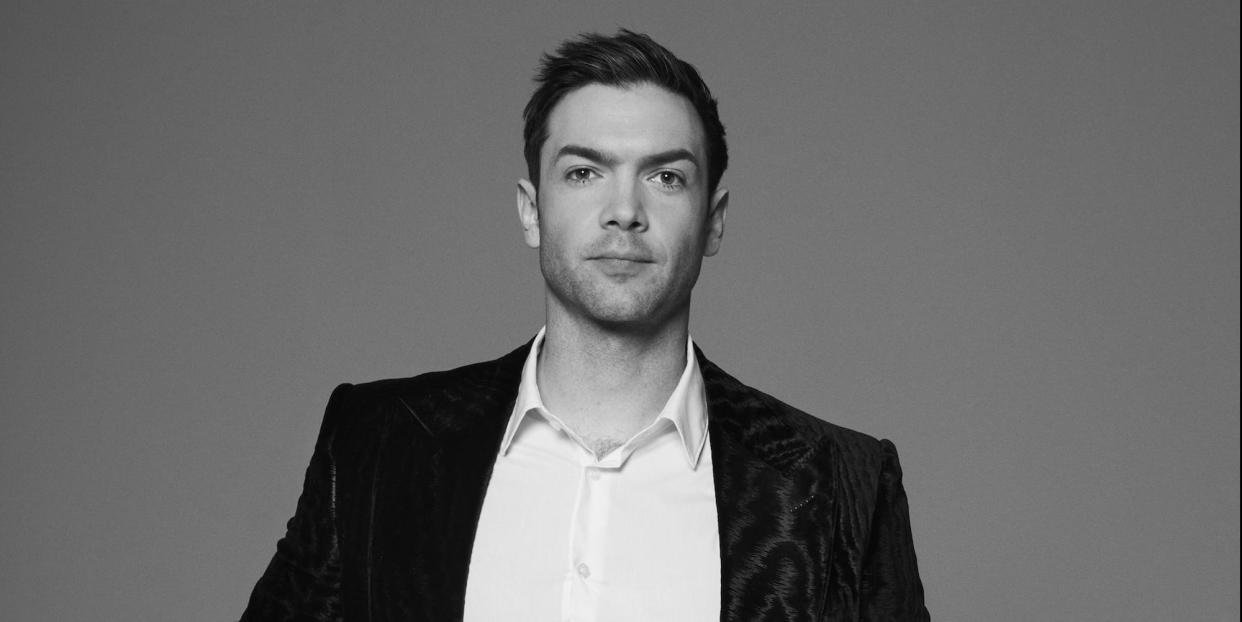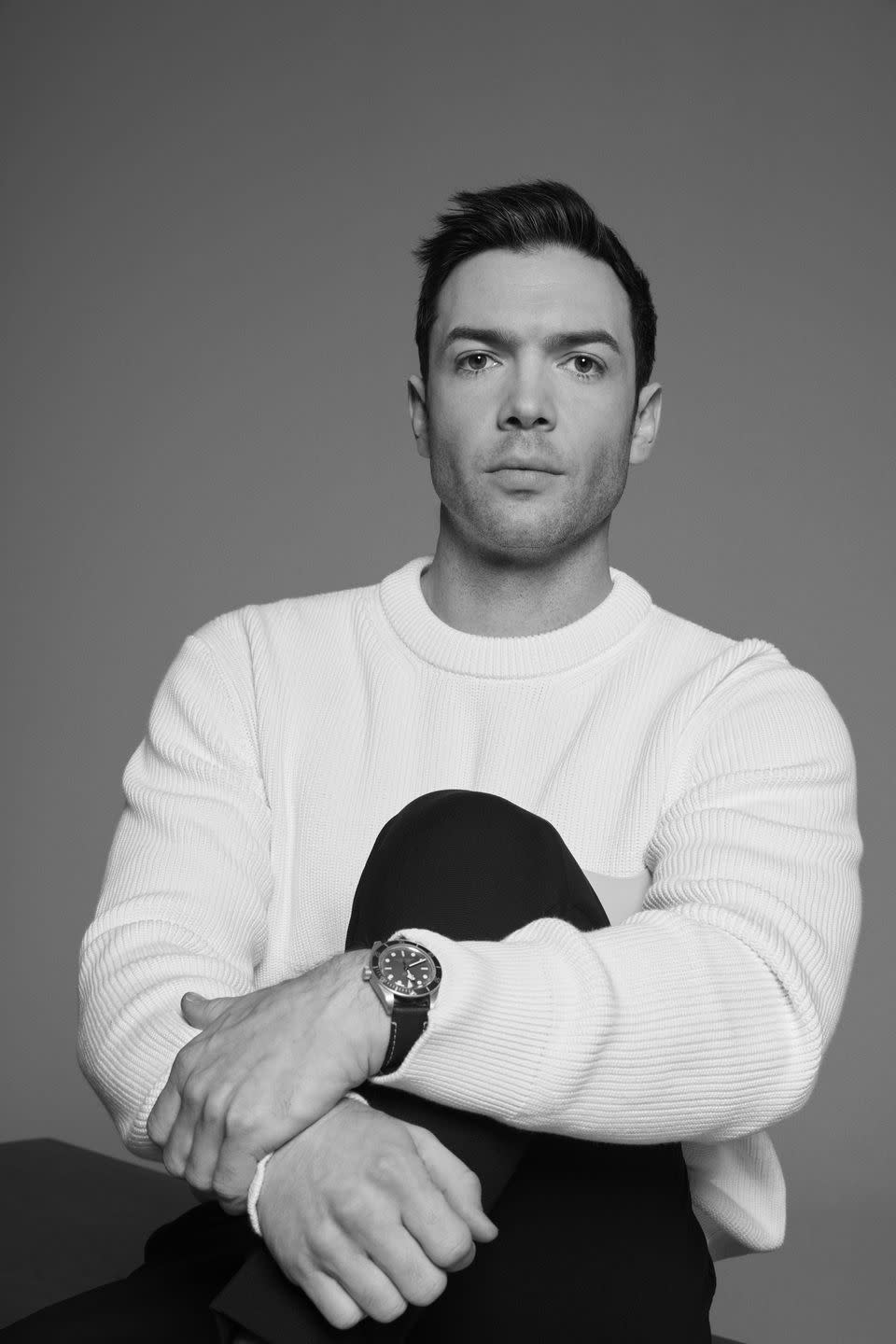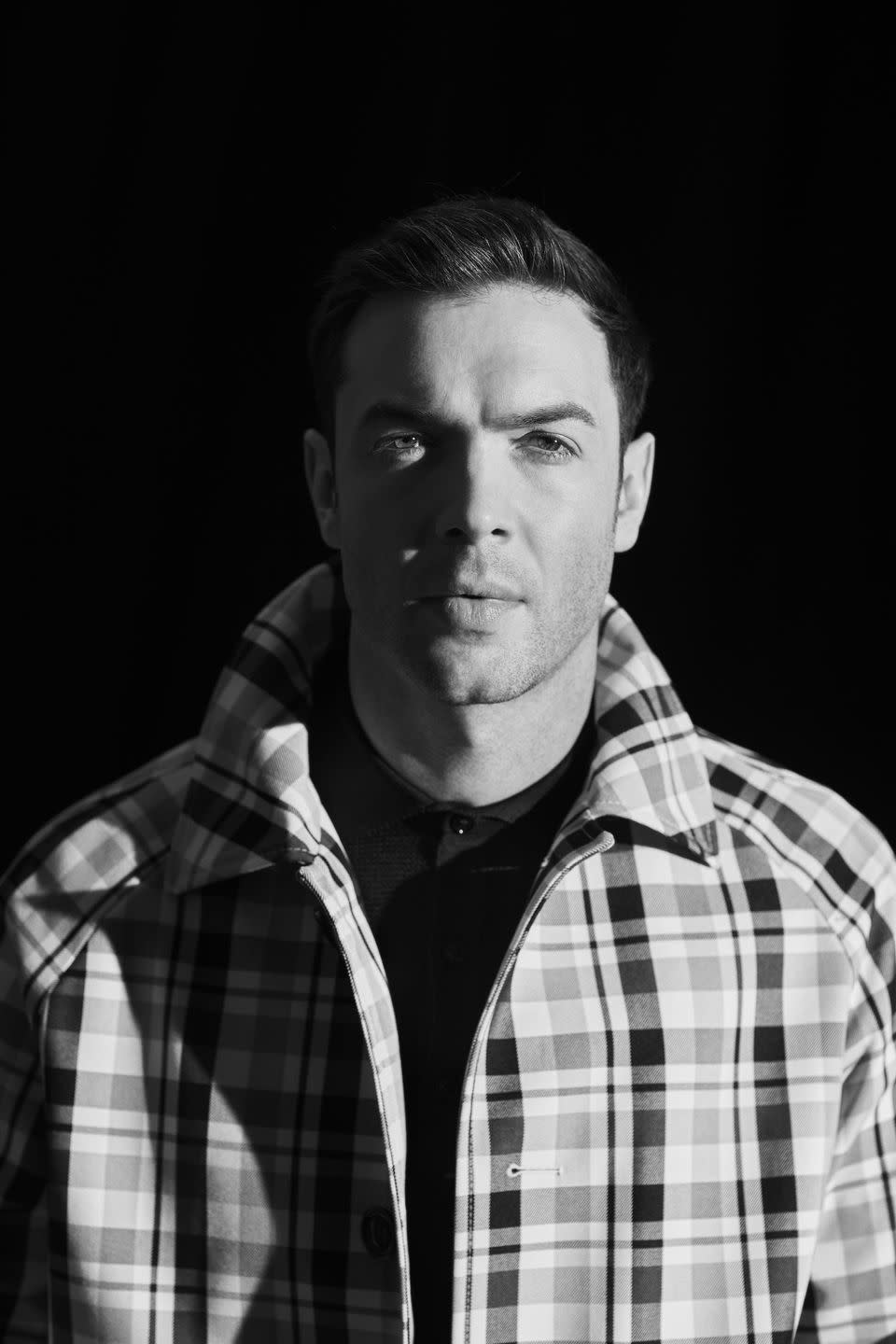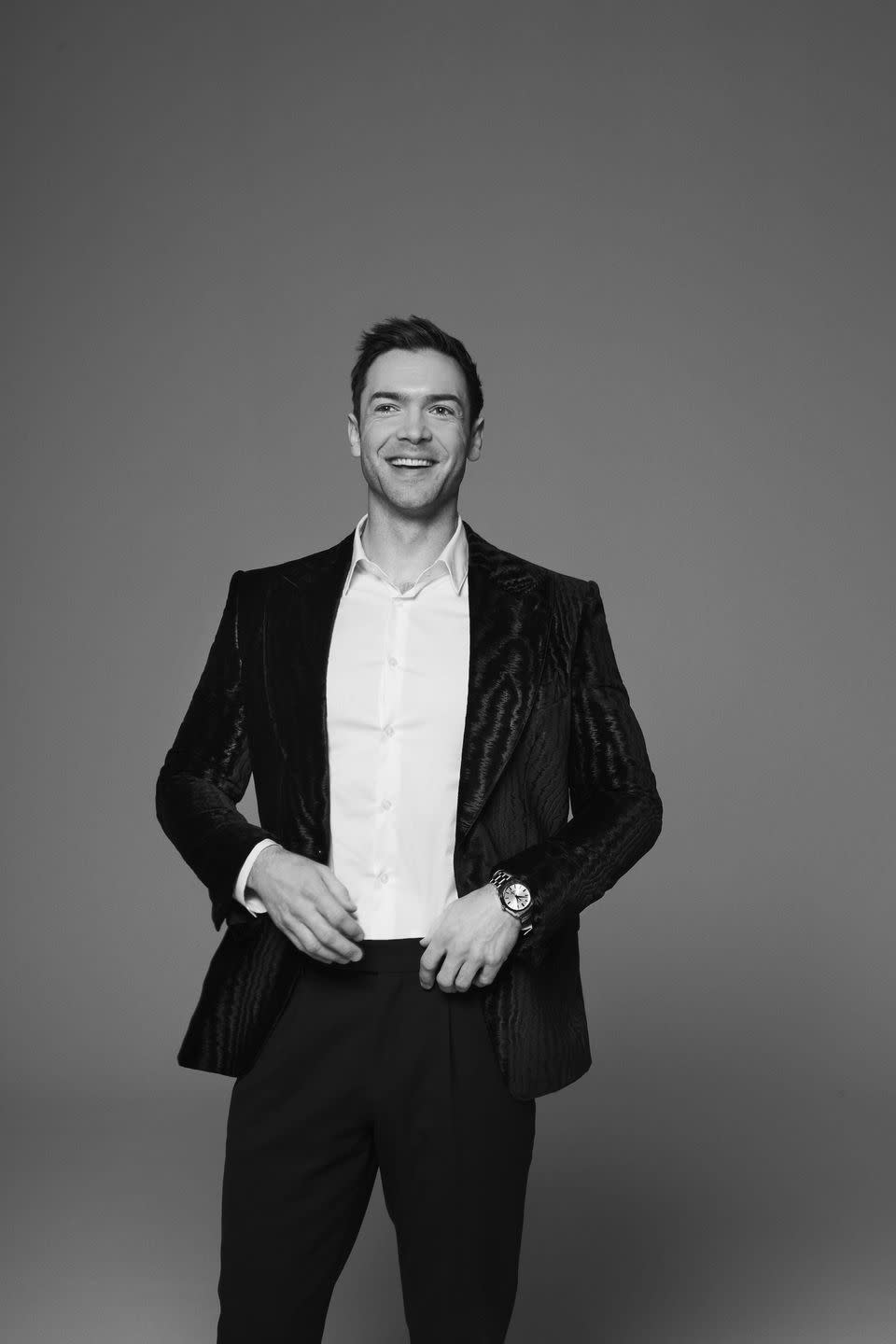Ethan Peck is Ready to Beam Up

- Oops!Something went wrong.Please try again later.
- Oops!Something went wrong.Please try again later.
- Oops!Something went wrong.Please try again later.
When Ethan Peck was cast as Spock, Star Trek’s legendary science officer, two extraordinary things happened. First, he nearly blacked out. Then, he embarked on a journey of “profound evolution” to become someone worthy of wearing those iconic pointy ears. The pursuit of living up to Spock changed him—made him more confident, more deliberate, more considered. Four years after his fateful debut, the imposter syndrome has worn off, but the journey of becoming remains ongoing. “I’m still trying to grab the Vulcanism in myself,” he tells Esquire.
Peck is the third actor to shave his eyebrows and suit up as everyone’s favorite Vulcan; the late Leonard Nimoy originated the role in Star Trek: The Original Series, then passed the baton to Zachary Quinto for J.J. Abrams’ three Star Trek films. Peck joined Paramount’s ever-expanding Star Trek universe in 2018, when Spock figured into season two of Star Trek: Discovery as the estranged brother of protagonist Michael Burnham. Spock and his reimagined Enterprise colleagues made such a splash on Discovery that fans clamored for a spin-off—and got their way, luckily for the rest of us. This spring, that long-awaited series arrived in the form of Strange New Worlds, a back-to-basics return to the episodic storytelling of The Original Series, set during the captaincy of Christopher Pike (Captain Kirk’s predecessor). Strange New Worlds is the best Trek outing in years: uplifting, optimistic, and gloriously retro, it’s a character-driven series where each episode pairs a top notch sociocultural story with some good, clean, spacefaring fun.
Part of the secret sauce behind Strange New Worlds is, of course, Spock. Peck has nailed everything fans know and love about this legendary character, from his arch formality to his bone-dry humor, while also boldly going where no one has gone before. For the first time ever, viewers get a peek into Spock’s sex life; in one standout episode, a soul-sharing ritual gone wrong sees Spock and his fiancée swap bodies, leading them to profound insights about duty and sacrifice (and, of course, some funny hijinks). But Peck doesn’t want too much credit for his rendition of the role. “I don’t feel like I have any ownership over Spock,” he tells Esquire. “I’m just a custodian.”
A lifelong science fiction fan and a deep, scholarly thinker, Peck has been thrown into the deep end of a multi-decade phenomenon—and come out the other side grateful and changed. He Zoomed with Esquire to discuss all things Star Trek, from what it’s like wearing the Vulcan eyebrows to how he ended up on an ocean cruise full of Trek fans. This interview has been lightly edited for length and clarity.
Esquire: What was your relationship to Star Trek before you joined the franchise?
Ethan Peck: I'm a big science fiction fan, but in my younger years, I somehow avoided or overlooked Star Trek. Then I became a big fan of J.J. Abrams’ Star Trek movies. I remember the very first time I saw the posters. Each character looked so developed and thrilling. I thought, “I wish I could do something like that.” Now I'm on Star Trek. It's crazy, but it’s exactly where I want to be in terms of genre.

ESQ: What are some other meaningful science fiction touchpoints for you?
EP: It started with Golden Age science fiction books. I recall reading Isaac Asimov’s The End of Eternity when I was around twelve years old—that was really seminal in terms of how I perceive the universe, and the bigger philosophical quest it sent me on. From a young age, Akira was huge for me, too. It asks so many big questions. It’s an allegory for the threat of nuclear war and the mass destruction we can wreak on ourselves, but it also asks: what is consciousness? That was the first time I'd been exposed to those ideas in a way that I could begin to understand. Of course, 2001: A Space Odyssey made a huge impact, too. Oftentimes a book comes out before a movie, but with 2001: A Space Odyssey, Kubrick reached out to Arthur C. Clarke and said, "I want to create the quintessential science fiction film. Will you help me?" The script was actually completed before the book. I remember reading the book and thinking, “I wish hadn't seen the movie so I could create my own imagery for this,” only to discover that it came out after. I love that book.
ESQ: When you first auditioned for Discovery, how did you feel about stepping into the iconic role of Spock?
EP: When I first auditioned, I didn’t even know what I was auditioning for. The project had a code name, so I was blissfully unaware. We knew that it was code for Star Trek, but I had no idea what the role was. I assumed it was something small. By the time I learned what the role was after two auditions, I was quite frankly terrified. I was terrified of the audition, but also of the need to live up to this mythical icon, as Spock has become. I blacked out the very last audition—I barely remember what I did. After getting the part, I was still terrified. I felt unworthy of it. I felt I had so much personal growth to undergo in order to fulfill the needs of this character. Spock is such a vast-minded person—he’s otherworldly, hyper-intelligent, and has great integrity. I’m constantly working to live up to him.
ESQ: What’s been your experience of joining and navigating this robust fandom?
EP: The conventions are surreal. You have a big group of people who love the concepts, the ideals, and the openness that Star Trek is a vessel for. They’re sometimes marginalized for different reasons, and they find a lot of commonality among one another. That’s a beautiful and incredible thing. I've been plugged into something much bigger than me. I don't feel like I have any ownership over Spock; I'm just a custodian. People come to me at these conventions, and it's almost like they want confirmation of some sort—to be seen by this character and this universe. They're not there to see Ethan. They're there to see Spock, and I just happen to be a representative of this character at this one point in time. These people are so thrilled and excited and moved by the world that we are a part of as actors, and they come with such vulnerability—that’s very special and unique. In the year after Discovery’s second season, I did thirteen conventions that culminated in Star Trek: The Cruise, which was wild. I kept thinking, “Wow, I get to have this experience. I get to see these people in this light and in under these circumstances.”
ESQ: I need to hear more about Star Trek: The Cruise.
EP: It's everything I've just described, but hyper-condensed and intensified, because you're on this floating skyscraper. I think there were around 2500 to 3000 guests on the ship, with about 30 "talents," as they refer to us. I would walk out of my little suite, which is basically a room with two double beds, and people would say, "Ethan Peck?" You're there with everybody. It’s mostly a celebration of the community that Star Trek has created, which is infused with the show's ideals and vision and optimism.
ESQ: Now that you've played Spock across multiple television shows, what keeps you coming back to him?
EP: I'm still trying to grab the Vulcanism in myself. I felt that I was called to undergo profound evolution to serve the needs of this character, because he’s just so extraordinary. I've been pushed to develop in ways that maybe I wouldn't have if I hadn't been cast in this role. I was cast in 2018, but I'm only just starting to feel like, “I’m here, and I’m doing this, and I'm capable of it.” I still have doubts about that sometimes because there's so much nuance to the character. That challenge is what brings me back. I don't see that it ever would get old or stale or known to me, because the writers keep presenting me with new challenges for this character, and I'm on my toes constantly.

ESQ: What are some of these ways that Spock has driven you to develop?
EP: He challenges me to be more confident. To have more useful thoughts. I found that I spent a lot of time thinking about ways in which I wasn't worthy or good enough, and that wasn’t useful. Spock would never have these thoughts—he would never think about something that doesn't have great utility. That rubbed off on me in the best way, though I’m still on that journey of weeding out toxic and circuitous thinking. I see Spock as a monument in motion, because he’s so pure and pristine in his decision-making, his actions, and his philosophy. As an artist and a person, that feels like a very worthy pursuit, to be in search of Spock.
ESQ: I feel like there’s a book here: The Spock Guide to Self-Help.
EP: It would be a bestseller. CBS should probably think about that.
ESQ: How did you approach making your Spock distinct from the previous iterations of the character?
EP: I’m still figuring that out. I'm so fundamentally different from Leonard Nimoy and Zachary Quinto, so I don't think I have to do too much work to differentiate myself, because I’m inseparable from my work. Another one of the reasons I knew I had to develop personally was because I needed to become greater and more myself to distinguish the character. Leonard Nimoy is inimitable; he brought certain qualities that I can observe and attempt to internalize, but I can't impersonate him, because that would be such a misstep. I had to understand the character and what he meant to me personally. What I bring to Spock is the impression that I have of him, which is unique to me, I think. I hope, anyway.
ESQ: Strange New Worlds finds a lot of new shades in Spock. Within the first fifteen minutes of Episode One, he's falling into bed his fiancée, T’Pring. Spock has had romances, but now, for the first time ever, he has a sex life. What was that like, to be the actor who gets to take him there?
EP: It was really scary, because there's no blueprint for that. Unfortunately, Leonard Nimoy is not alive to offer me any guidance or advice. Those moments are quite terrifying, because I'm treading into the unknown, and I'm captaining whatever ship is taking me there—albeit with a huge amount of support from the people that I work with. During my preparation for that scene, I thought, “What's too human? What's too sexual? What's too Vulcan? What's weird enough? What's so weird that it doesn't feel relatable to viewers?” That discussion was ongoing with Akiva Goldsman, who directed the episode, and Gia Sandhu, who plays T'Pring. It was a very careful and cautious process.
ESQ: Another shade you bring out in Spock is his capacity for humor. How do you make this guy who has no sense of irony or sarcasm so funny?
EP: A lot of that has to do with the writing. It’s always funny to see Spock in a situation where you think, “Oh no, this is going to be bad for Spock. He's going to do something awkward and goofy and strange.” When he comes into conflict with his own social constructs, that presents a lot of possibilities. For example, there’s a moment where Captain Pike smacks Spock on the shoulder, and he's mystified by the idea of someone touching him. The writers do such a great job of putting him in humorous situations and allowing him to be jocular.

ESQ: How has your grandfather Gregory Peck's legacy figured into how you approach your own work as an actor?
EP: I didn’t know him very well. Ten or fifteen years ago, I wanted to reject the part of me that comes from him, because I felt so undeserving of that pedigree. There’s nothing I did to earn a position in my family tree—I could have been born anywhere. That’s something I ruminate on quite a lot, and now, I feel extremely lucky to be a part of this family, because it does come with perquisites. I think the greatest gift from my grandfather is the possibility of huge success. A lot of people are born into families that don't have this level of recognition, so to attain that seems like an impossible, otherworldly thing. For me, that level of respect and public appreciation felt achievable. In terms of success, it’s given me an openness to the strange or the weird. I’m so proud of being on this show. I can't believe it. I feel so lucky to be a part of Star Trek and to be Spock; that feels like a really big achievement. I can trace that sensation of success back to being born into this family.
ESQ: In the series premiere of Strange New Worlds, we learn about World War III on Earth. Humanity tore itself apart in its own hubris, with thousands of species and hundreds of thousands of lives lost. Star Trek has provided half a century’s worth of commentary on human society, but what does Strange New Worlds have to say about our current moment?
EP: There's a useful scientific analogy called the Great Filter. I'm probably not going to speak very knowledgeably about it because I'm not a scientist. Essentially, civilization will obtain a level of technological development that enables us to destroy ourselves, and that point in time becomes a filter. Will we destroy ourselves, or will we evolve beyond that primal warring state? I think that’s where we’re at. When you look at the news, it's just people killing people because of ideas. People are so afraid of other people's ideas. Strange New Worlds reminds us, “Be careful about your fear, and about the violence that your fear inspires.” That’s a message we can never hear often enough.
One of my buddies always says, "We're just monkeys, man." There's a hopelessness about where we're at, because the behavior of destroying ourselves and killing one another has become so redundant. Strange New Worlds is trying to highlight the tragedy of that, and it's begging us to move beyond it—to move forward, to unite and combine our energies, to be curious about what more is out there.
ESQ: I’ve got just one last question for you—the question every actor playing Spock has to answer. What’s it like walking around with these eyebrows?
EP: I honestly don't even think about it. My friends will say, "Oh man, your eyebrows are so fucked up.” I'm sure other people are thinking, "What's going on with your face?" But I don’t even care. It’s all so worth it.
You Might Also Like

